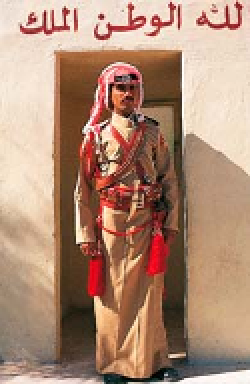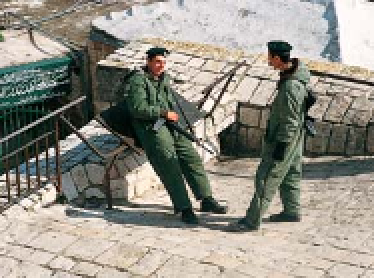Travel Reference
In-Depth Information
Security and Health
Israel and the Middle East suffer from a bad press
when it comes to security. However, despite the
occasional alarming headline, Israel and its neigh-
bouring territories of Jordan and Sinai are perfectly safe
for tourists. Visitors rarely encounter crime, and there
are next to no hazards in the form of dangerous
animals, or endemic diseases. Political unrest does from
time to time result in acts of terrorism or rioting, but
this hardly ever affects visitors. With the present
ongoing attempts to reach peace between Israel and
the Palestinians, even these infrequent incidents of
violence may, hopefully, soon be a thing of the past.
entering hotels, restaurants,
bars, cinemas and shopping
complexes, so it is wise always
to carry some identification,
preferably your passport.
But as far as the visitor is
concerned, terrorism is not
a major worry. Tourists have
never been the target of
terrorists and most attacks have
occurred well away from all
tourist sites. Naturally, you
have to be alert when
in the streets, and
also keep an eye
on the local news.
Among the “sen-
sitive” areas are
East Jerusalem
and West Bank
towns such as
Hebron and
Ramallah. In times of
unrest you should
definitely give such
places a wide berth.
Should you be
unlucky enough
to encounter a
disturbance in the
streets, move away
from the scene quickly, and
make it completely clear that
you are a foreign tourist.
Stories of theft, mugging and
other similar opportunistic
crimes are rare in the Holy
Land. Crime is not the problem
here that it is in many other
parts of the world. As a rule,
all areas are considered safe
for visitors, unless the visitor
is an unaccompanied woman.
Lone females are frequently
subjected to unwanted verbal
pestering and harrassment
from local males, both Israeli
and Arab. This problem is
particularly acute in Jerusalem's
Old City and its surrounding
areas, such as the Mount of
Olives and Mount Zion.
Incidences of rape have even
been reported, and so our
advice to women must be
that they should not walk
alone in unpeopled areas or
in the Old City after dark.
perform military
service in the
Israeli Defence
Force (IDF) as
soon as they
reach the age
of 18. The term
of service is
three years for
men and two
years for
women. Men
serve for an
additional 30
days a year until
the age of 35. Consequently,
you will see armed soldiers
around all the time, particularly
at bus stations, as they are
usually on the way to or
from their bases.
Israeli
policeman
Israeli Defence Force soldiers at Damascus Gate
LAW AND ORDER
Israel, Jordan and Sinai all
have special tourist police to
deal with any complaints or
problems visitors may en-
counter. These police mostly
speak English, and are posted
at most major sites and at
tourist resorts. They wear
identifying armbands. The
Jordanians have a special
form of tourist police, active
in the Wadi Rum area, known
as the Desert Patrol. These
officials are easily identified
by their smart khaki uniforms,
their distinctive red-and-white
checked headdress and by the
fact that they often ride camels.
Normal Israeli police wear
navy blue uniforms and
peaked caps. Also part of the
police force are the border
guards, who wear a military
style uniform and a green
beret. They operate mainly
in the Israeli-controlled areas
of the West Bank. The Pales-
tinians also have their own
security forces, who come
in a multitude of guises.
V
i
sitors will notice a prepon
PERSONAL SAFETY
On arrival at Ben Gurion
Airport, you will almost
immediately experience just
how tight security is in Israel.
During your stay, you may be
subject to security checks on
PERSONAL PROPERTY
On the whole Israelis and
Arabs are very honest
people. Arabs, especially, will
go to great lengths to return
lost property. If you lose
anything it is always worth
going to the last place the
-
derance of military personnel
on the streets in Jerusalem
and Israel. Every citizen must
A member of the Desert Patrol,
Wadi Rum, Jordan










